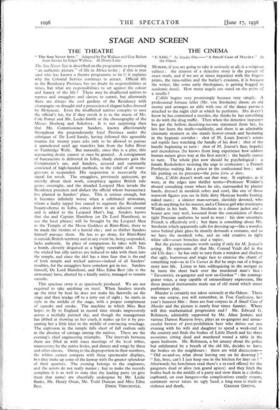STAGE AND SCREEN
THE THEATRE
" The Sun Never Sets." Adapted by Pat Wallace and Guy Bolton from Stories by Edgar Wallace. At Drury Lane The Sun Never Sets is described on the programme as presenting " an authentic picture " of life in Africa to lay : if this is true (and who has known a theatre programme to lie ?) it explains why the Colonial Service continues to attract. Official life in the Residency Province has no doubt its responsibilities at times, but what arc responsibilities to set against the colour and luxury of the life ? There may be disaffected natives to repress and smugglers and slavers to outwit, but afterwards there are always the cool gardens of the Residency with champagne on draught and a procession of elegant ladies dressed by Molyneux. Even the disaffected natives conspire to ease the official's lot, for if they revolt it is to the music of Mr. Cole Porter and Mr. Leslie-Smith or the choreography of the Misses Slosberg and Sokolova. It is not surprising then that Mr. Commissioner Sanders, known affectionately throughout the preponderantly loyal Province under the sobriquet of Dc Lord Sandy, having followed this agreeable routine for twenty years asks only to be allowed to pursue it unmolested until age transfers him from the Isibu River to Tunbridge Wells. But naturally, since this is a play, this unexacting desire cannot at once be granted. A consignment of bureaucrats is delivered in Isibu, shady elements gain the Commission's ear, and Sanders, accused and summarily convicted of high-handed methods, to the relief of all trans- gressors is suspended. His suspension is necessarily the signal for revolt. The smugglers, previously quiescent, go merrily about their work, conspiracy against British rule grows overnight, and the dreaded Leopard Men invade the Residency precincts and abduct the official whom bureaucracy has planted in Sanders' place. This is serious enough, but it becomes infinitely worse when a celebrated airwoman, whom a faulty tappet has caused to augment the Residential beauty-chorus in Isibu, comes down in an adjacent swamp and is added to the Leopard Men's bag. Sanders knows that she and Captain Hamilton (or De Lord Hamiltoni, to use the local phrase) will be brought by the Leopard Men to the Temple of the Moon Goddess at Rimi-Rimi, there to be made the victims of a horrid rite ; and so thither Sanders himself pursues them. He has to go alone, for Rimi-Rimi is outside British territory and in any event he, being suspended, lacks authority. In place of companions he takes with him a bomb, cleverly disguised as a highly venerable idol. This the wicked but silly natives are induced to take with them into the temple, and since the idol has a time fuse that is the end of both temple and wicked natives—indeed of all Sanders' troubles, for the smugglers have somehow got in too. Sanders himself, De Lord Hamiltoni, and Miss Edna Best (she is the airwoman) have, abetted by a kindly native, managed to remain outside.
This spacious story is as spaciously produced. We are not required to take anything on trust. When Sanders travels up the river by boat he does not make his farewells on the stage and then trudge off to a jetty out of sight ; he starts in style in the middle of the stage, with a proper complement of squeaks and smoke. The machine in which Miss Best hopes to fly to England in record time streaks impressively across a tactfully painted sky, and though the management has jibbed at showing us her crash, it makes up for it by pre- senting her a little later in the middle of convincing, wreckage. The explosion in the temple falls short of full realism only in the absence of carnage among the natives. These are the evening's chief engineering triumphs. The intervals between them are filled in with mass meetings of the local tribes, manoeuvres by the native levies, and dances and songs by these and other classes. Owing to the disproportion in their numbers, the whites cannot compete with these spectacular displays, bt t they make up some of the leeway with the greater splendour of their quarters. The evening belongs to the engineers, and the actors do not really matter ; but to make the records complete it is as well to state that the leading parts (to give them that name) are cheerfully undergone by Mr. Leslie Banks, Mr. Henry Oscar, Mr. Todd Duncan and Miss Edna


















































 Previous page
Previous page